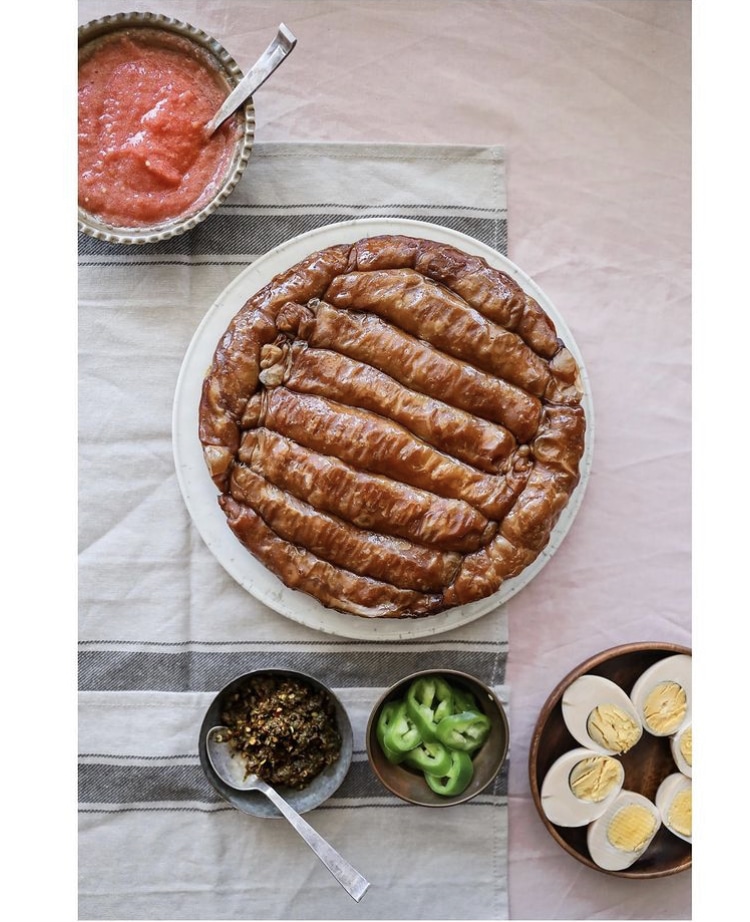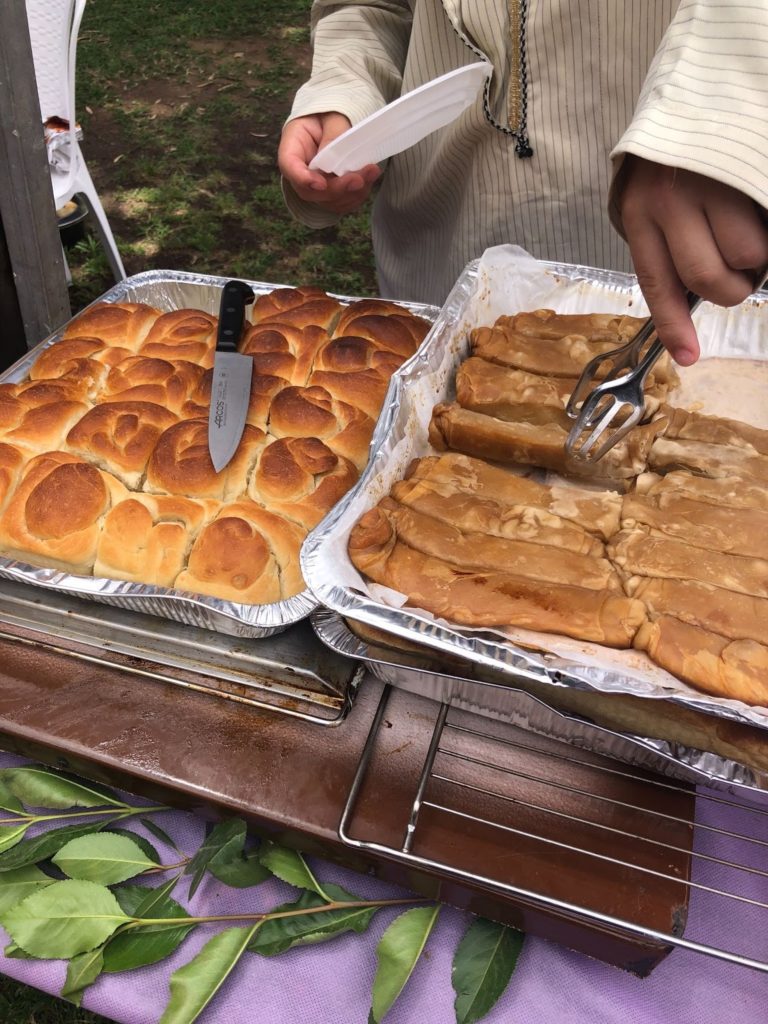
Jachnun is a delicious slow-cooked Jewish Yemenite dough, prepared on Friday before Shabbat and enjoyed on Saturday mornings. This Middle Eastern bread came to Israel from a southern port-city in Yemen called Aden and is believed to have been eaten after morning prayers on Shabbat.
However, surprisingly, most Yemenite Jews living outside of Aden actually only discovered Jachnun after they immigrated to Israel! Now, the dish is one of the most common and beloved breakfast dishes in the entire country.

Where does jachnun come from?
Though commonly referred to as a Yemenite dish, the origins of jachnun may actually be Turkish, Spanish, or even Indian!
The first jachnun origin theory is that the dish is a variation of a Turkish dish called gul which has a very similar dough recipe. However, bakers of gul commonly rolled meats and potatoes into their dough, leading followers of this theory to believe that the Jewish Yemenite community removed the meat in order to make the dish kosher.
Eventually, the potatoes were replaced with eggs, and while on its way to Israel, crushed tomatoes and a Mediterranean sauce called schug made their debuts as side dishes for the tasty morning meal.
Another idea holds that jachnun actually originates from Spain and arrived in Aden with the expulsion of the Jews in the 1400s. Followers of this idea note the resemblance between the Spanish puff pastry dough called hojaldre.
The last main thought holds that jachnun originates from India, since a large portion of the Jewish Yemenite population came from there as well.
How do you pronounce jachnun?
The way one pronounces the dish can actually tell you a lot about their connection to it. Most people today pronounce the dish as “ja-ch-noon”, however Yemenite Jews from Aden sometimes refer to the dough as “ga-ch-noon”.
Also, Yemenites from Saana, a city about 250 miles north of Aden, call the dish “jee-ch-noon”, pronouncing the meal close to its original Yemenite Arabic pronunciation where “jee-ch-eena” and “oon” combine to mean “little dough”.
How long does it take to make jachnun?
Jachnun is a relatively simple dish to prepare in terms of ingredients, however the preparation process takes a long time. Most jachnun bakers prepare the dough on Friday mornings, leaving it to flatten for a few hours before folding/shaping the dough into its final form.
Then, bakers line the rolls into a large pot and leave them to slow-cook for about 16 hours before serving them on Saturday mornings. All in all, it takes around 24-hours to prepare this dish to perfection.
Ingredients:
- 1 kilo of bread flour
- 7 tbsp of brown sticky sugar
- 1 tsp of salt
- 2½ cups of lukewarm water
- Canola oil
- 1 pita
- Melted margarine
Directions:
- Pour 1 kilo of bread flour into a mixing bowl through a strainer.
- Add 7 tablespoons of brown sticky sugar.
- Add 1 teaspoon of salt.
- Add 2½ cups of lukewarm water.
- Mix with your hands until the mixture is sticky and there is no more loose flower in the bowl.
- Put a lid or nylon wrap over the mixing bowl for 15 minutes.
- During these 15 minutes, the dough should flatten slightly.
- Pour a full cup of canola oil onto your hands and start kneading for 2-3 minutes.
- Put a lid or nylon wrap over the mixing bowl for 1 hour.
- During this hour, the dough should flatten again.
- Lay out an array and line it with parchment paper.
- Pour a half cup of canola oil onto your hands.
- Divide the dough into 10-12 balls and line them on the parchment paper.
- Pour some more canola oil onto your hands and using your hands, coat the tops of the balls with oil.
- Cover the tray in plastic wrap for 6 hours or for the entire night.
- Take out your jachnun pot (a large pot) and put a pita at the bottom of the pot.
- Line the bottom of the pot (over the pita) with parchment paper.
- Place one of your flattened dough balls onto your clean countertop.
- Apply a little bit of canola oil to your hands.
- Stretch the dough out so that it’s super thin (to the point where you can see through it).
- Use a baking brush to coat the thin dough with melted margarine.
- Fold the dough once from the right and left inwards.
- Use the baking brush to coat the doat with more melted margarine.
- Roll the dough from the bottom to the top (pulling the dough a bit more down each time).
- Put the dough in the pot.
- Repeat for all the balls.
- Take a piece of baking paper and put it on top of all the dough once they’re in the pot.
- Put a lid on the pot.
- Leave for 16 hours in the oven at 100 degrees celsius.
- Serve.
Why is jachnun so popular?
Besides being delicious, jachnun “travels well” meaning it is incredibly easy to pack for Saturday morning picnics, trips, etc… It also is a relatively cheap meal, ranging from 15-25 shekels (($4.50 to $7.60) on average. Many jachnun sellers also prepare the dish with margarine, making the dish especially attractive to the 450,000 Israelis who identify as vegan.
Where can I find jachnun in Israel?

Early on Saturday mornings, thousands of makeshift signs appear all over the country, directing jachnun-lovers to any of the following three most common places to find jachnun.
- #1 – Stands alongside the highway
If you drive on Saturdays, you can most definitely find pop-up jachnun stands at different rest stops alongside the highway.
- #2 – Yemenite Restaurants
Most Yemenite restaurants will serve jachnun on Saturday mornings, and some may even serve the dish on other days throughout the week.
- #3 – Private kitchens all throughout the country
Some of the most delicious jachnun sellers actually happen to be your average Yemenite Jews, selling the meal from their own private kitchens on Saturday mornings.
Observant Jews are known to make deals ahead of time with their favorite jachnun spots, paying before Shabbat so they too can enjoy the treat on Saturday.
Originally Published Apr 16, 2021 11:31AM EDT
